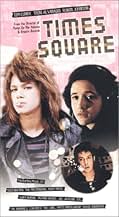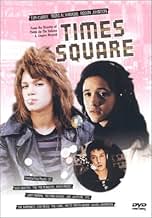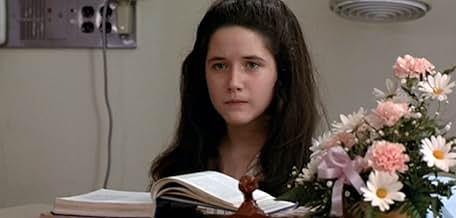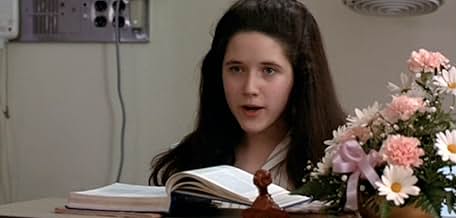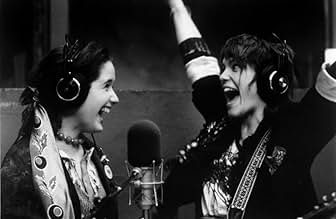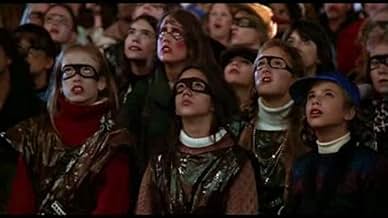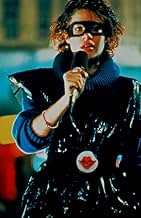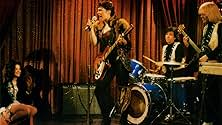IMDb-BEWERTUNG
6,6/10
2212
IHRE BEWERTUNG
Füge eine Handlung in deiner Sprache hinzuTwo ill-matched teenage girls form a punk band and soon have New York City by its ears.Two ill-matched teenage girls form a punk band and soon have New York City by its ears.Two ill-matched teenage girls form a punk band and soon have New York City by its ears.
- Regie
- Drehbuch
- Hauptbesetzung
- Auszeichnungen
- 2 Nominierungen insgesamt
Elizabeth Peña
- Disco Hostess
- (as Elizabeth Pena)
Empfohlene Bewertungen
10Kitale
First of all, I saw the preview of the movie before it came out and it had the scene where Nicky silently urges Pammy to run away with her from the hospital, to The Ramones' "I Wanna Be Sedated". That alone blew me away. Then I bought the 2 LP soundtrack before the movie came out and listened to it over and over. By the time the movie premiered, I was more than ready for it. It showed for two weeks at a local theater and I saw it once a day every day for two weeks. I really had no life! I ordered the VHS tape sometime in the 80's and paid $60 for it. Now I own the DVD and enjoyed the commentary. I don't have the CD and wonder if The Cars' Dangerous Type is on it.
Anyway, I don't have to tell you I loved it very much.
I know the editing was clumsy and they cut out so many scenes that sometimes it didn't make any sense, but it is such a fun movie. the soundtrack is the best ever. The Ramones, Suzi Quatro, Patti Smith, Pretenders, Robin Johnson, Roxy Music, XTC, Desmond Child & Rouge, The Cars (not included on the soundtrack), etc. This movie introduced me to New Wave and punk. There are so many neat scenes in the movie: - The seduction - non-verbal with only Ramones singing "I Wanna Be Sedated - of Pammy by Nicky to leave the hospital. - The card game on the street "You snooze you lose" - Running through the adult theater. - The hilarious hold-up - Dropping TVs to The Cars' "Dangerous Type" - "Your Daughter Is One" - Any scene with Tim Curry - "Life, more than Television."
Do I love this movie or what?
Anyway, I don't have to tell you I loved it very much.
I know the editing was clumsy and they cut out so many scenes that sometimes it didn't make any sense, but it is such a fun movie. the soundtrack is the best ever. The Ramones, Suzi Quatro, Patti Smith, Pretenders, Robin Johnson, Roxy Music, XTC, Desmond Child & Rouge, The Cars (not included on the soundtrack), etc. This movie introduced me to New Wave and punk. There are so many neat scenes in the movie: - The seduction - non-verbal with only Ramones singing "I Wanna Be Sedated - of Pammy by Nicky to leave the hospital. - The card game on the street "You snooze you lose" - Running through the adult theater. - The hilarious hold-up - Dropping TVs to The Cars' "Dangerous Type" - "Your Daughter Is One" - Any scene with Tim Curry - "Life, more than Television."
- Both performances of "Damn Dog" - "Hit me again, you're a big man" - Pammy dancing to Lou Reed's Take A Walk On The Wild Side.
- Waking up to Suzi Quatro's "Rock Hard". - Tim Curry dancing to "Rock Hard" - "I may be brave but you're the pretty one. I'm a freak of f**king nature"
- Pammy dancing to Desmond Child & Rouge's "The Night Was Not". - Tim Curry's poetry. - The Sleaze Sisters and their imitators wearing trash bags.
- The opening credits to Roxy Music's "Same Old Scene"
- Stealing the ambulance and getting away with it. - "M-e-t-h-o-d-i-s-t- e-p-i-s-c-o-p-a-l" "Take a p*** you a**hole"
Do I love this movie or what?
I grew up in the Detroit area - there was an underground punk scene in the city, but I didn't know much more about punk until I saw this movie.
My name is Pam, and my best friend and I called each other Nicky and Pammy for months after seeing this movie. Great teen rebellion flick, great gritty scenes of NYC. The concert at the end is awesome - Damn Dog was my favorite song. Loved Trini Alvarado. Surprised she didn't do a lot more acting.
I wish I still had the album; it is even better than the movie. I'm looking in used record stores for it, and hopefully will find it.
My name is Pam, and my best friend and I called each other Nicky and Pammy for months after seeing this movie. Great teen rebellion flick, great gritty scenes of NYC. The concert at the end is awesome - Damn Dog was my favorite song. Loved Trini Alvarado. Surprised she didn't do a lot more acting.
I wish I still had the album; it is even better than the movie. I'm looking in used record stores for it, and hopefully will find it.
The film is very cool. Robin Johnson is GREAT as Nikki. The soundtrack is one of my favorite movie soundtracks of all time. This was the first VHS movie I ever bought. Fans of punk music and punk movies will LOVE this film.
7thao
This was a huge favorite of mine as a teenager. I have been looking for a copy of the film for the longest time and finally found one in Germany. It's strange that it's so hard to get a copy of a big cult film like this one.
The film captures well the essence of punk. It is about Nicky and Pamela, two teenage NYC girls. Nicky is from the streets with a dark past and from a broken home. She has serious anger issues but is street smart and has artistic talents. Pamela is from a rich (political) family, with the security that Nicky never had but suffers because her father does not understand her. She is a great poet and full of empathy but has never dared to live her life or take a chance. They meet at a hospital and run away. Together they start a mini punk renaissance in New York CIty.
Into this mix comes a radio host called Johnny LaGuardia (played by Tim Curry) who got a letter from Pamela before she ran away. When he finds out that Pamela is living on the streets he decides to use it to get a small scoop but also to fight against the politics Pamela's father stands for. Johnny LaGuardia wants NYC to stay as it is while Pamela's father wants to clean up the streets. Tim Curry is the weakest link in this film. It's hard to tell if it is because of the script or because he or the director did not understand Johnny LaGuardiahe. Tim Curry plays him as some kind of prophet while everything points to him being a self serving, fame seeking egocentric megalomaniac. Tim Curry is at least never a convincing prophet and we never get the feeling that Tim Curry is playing him sarcastically either.
Not every scene works in this film and it does not hold perfectly together but it has a very rich soul and a desire for sincerity which is very contagious. It also captures well the culture of NYC in the late 70s/early 80s and the reason why punk spoke to the youths. And it has one of the best sound track ever (including The Ramones, The Cure, XTC, Lou Reed, Gary Numan, Talking Heads, Garland Jeffreys, Joe Jackson, Suzi Quatro, Roxy Music, Patti Smith and The Pretenders.) and a lot of wonderful poetry, like this one:
"Dear Daddy, I am not kidnapped. I am me-napped, I am soul-napped, I am Nicky-napped, I am happy-napped.
We are having our own renaissance."
The film captures well the essence of punk. It is about Nicky and Pamela, two teenage NYC girls. Nicky is from the streets with a dark past and from a broken home. She has serious anger issues but is street smart and has artistic talents. Pamela is from a rich (political) family, with the security that Nicky never had but suffers because her father does not understand her. She is a great poet and full of empathy but has never dared to live her life or take a chance. They meet at a hospital and run away. Together they start a mini punk renaissance in New York CIty.
Into this mix comes a radio host called Johnny LaGuardia (played by Tim Curry) who got a letter from Pamela before she ran away. When he finds out that Pamela is living on the streets he decides to use it to get a small scoop but also to fight against the politics Pamela's father stands for. Johnny LaGuardia wants NYC to stay as it is while Pamela's father wants to clean up the streets. Tim Curry is the weakest link in this film. It's hard to tell if it is because of the script or because he or the director did not understand Johnny LaGuardiahe. Tim Curry plays him as some kind of prophet while everything points to him being a self serving, fame seeking egocentric megalomaniac. Tim Curry is at least never a convincing prophet and we never get the feeling that Tim Curry is playing him sarcastically either.
Not every scene works in this film and it does not hold perfectly together but it has a very rich soul and a desire for sincerity which is very contagious. It also captures well the culture of NYC in the late 70s/early 80s and the reason why punk spoke to the youths. And it has one of the best sound track ever (including The Ramones, The Cure, XTC, Lou Reed, Gary Numan, Talking Heads, Garland Jeffreys, Joe Jackson, Suzi Quatro, Roxy Music, Patti Smith and The Pretenders.) and a lot of wonderful poetry, like this one:
"Dear Daddy, I am not kidnapped. I am me-napped, I am soul-napped, I am Nicky-napped, I am happy-napped.
We are having our own renaissance."
I must confess up front to a favorable bias toward "Times Square". Just before its release I recall seeing the trailer and being won over by the scene in the hospital where Nikki begins eating the flowers. Since this was only about 10 seconds into the trailer it is fair to say that I immediately connected with the film. The same trailer is included with the DVD and I was happy to see that my memory of the event was accurate. After seeing the actual feature I went out and bought the double album, which I still own.
I know more about films now than I did 25 years ago and thanks to the DVD commentary (by Director Allen Moyle and Robin Johnson-who played Nikki) I now know a lot about what went into the making of "Times Square". Unfortunately Robin's co-star Trini Alvarado (Pammy) was not available for the commentary. Although most viewers consider Nikki the central character, Nikki really needs Pammy to play off (much like Charlize Theron needs Christina Ricci's reaction shots in "Monster"), plus Pammy's scenes without Nikki are some of the best in the film and Pammy is the character who undergoes all the changes in the story, so you can't really say that one of them is more important than the other.
"Times Square" suffered the same fate that Orson Welles' "The Magnificent Ambersons" did 40 years earlier. The producers took control of the final cut, re-shot some scenes, deleted others, and released a version that did not reflect the director's vision. Apparently no one has ever been able to find the deleted footage for either film. Although "Times Square" was butchered even more than "Ambersons", it seems to have been less damaged. In part that is because the originally intended version would never have approached the perfection of the original "Amberson's". Perhaps more importantly, "Times Square" has a Haskel Wexler gritty documentary style that simply transcends the narrative elements of the story. So changes to the storyline could not take away from its basic ambiance nor from its preservation of the look of 1979 Times Square-something that was even then a ghost world.
Moyle now wishes he had not left the production after a dispute over including additional songs (so they could have a double album) because his continued presence would at least have had some damage control value. Producer Robert Stigwood ("Saturday Night Fever", "Saying Alive", "Jesus Christ Superstar", Sgt. Pepper's Lonely Hearts Club Band" ) was determined to release yet another of his musical exploitation films designed to make a lot of money on the soundtrack. This accounts for the inclusion of the completely inappropriate "Help Me" (The Bee Gees), the movie actually goes out on that song although they switch to something more appropriate midway through the credits.
The commercialization of the film also included dropping all obvious hints of a lesbian relationship between the two girls. This was probably a commercial mistake because a public controversy might have actually increased attendance. Ironically, if the lesbian angle had remained Moyle would have been accused of exploitation because it is really unnecessary for the storyline. Likewise the script changes needed when Alvarado refused to dance topless saved Moyle from looking like an exploiter.
While what survives has major continuity and character development issues, the core of the story may actually work better. Two emotionally damaged girls-polar opposites- bond and help each other. It ends with Altman's cool "Kansas City" twist where the seemingly weaker girl becomes protective of the tough girl.
I like the way that Pamela's father finally gets it and backs away, letting her continue to help Nikki until she feels that Nikki can continue without her. You first realize how strong and together Nikki has made Pammy by the end of my favorite montage sequence. After ordering her out, Nikki trashes their room, tries unsuccessfully to commit suicide, and completely breaks down at the radio station. Inter-cut with this is a shot of Pammy standing outside her father's home. At the station Nikki is screaming "Pammy" over and over as they agreed to do earlier in the film in moments of total despair. The audio of these screams is extended into the morning after establishing shot of their dock building. Johnny comes into the seemingly empty room and lifts the blanket revealing a peacefully sleeping Pammy sucking her thumb-she has returned to help Nikki.
Another highlight is the scene I already mentioned of Nikki eating the flowers in their hospital room. What makes this work is its point-of-view dynamic. Moyle artfully connects us to Pammy for the first time by allowing us to see Nikki from her POV. Later he places us back into Pammy's POV as Nikki non-verbally convinces Pammy to leave the hospital with her. The hospital exit scene only works credibility-wise because the first scene set us up for it.
Finally there is Nikki's "people dig dyin on me" line.
I know more about films now than I did 25 years ago and thanks to the DVD commentary (by Director Allen Moyle and Robin Johnson-who played Nikki) I now know a lot about what went into the making of "Times Square". Unfortunately Robin's co-star Trini Alvarado (Pammy) was not available for the commentary. Although most viewers consider Nikki the central character, Nikki really needs Pammy to play off (much like Charlize Theron needs Christina Ricci's reaction shots in "Monster"), plus Pammy's scenes without Nikki are some of the best in the film and Pammy is the character who undergoes all the changes in the story, so you can't really say that one of them is more important than the other.
"Times Square" suffered the same fate that Orson Welles' "The Magnificent Ambersons" did 40 years earlier. The producers took control of the final cut, re-shot some scenes, deleted others, and released a version that did not reflect the director's vision. Apparently no one has ever been able to find the deleted footage for either film. Although "Times Square" was butchered even more than "Ambersons", it seems to have been less damaged. In part that is because the originally intended version would never have approached the perfection of the original "Amberson's". Perhaps more importantly, "Times Square" has a Haskel Wexler gritty documentary style that simply transcends the narrative elements of the story. So changes to the storyline could not take away from its basic ambiance nor from its preservation of the look of 1979 Times Square-something that was even then a ghost world.
Moyle now wishes he had not left the production after a dispute over including additional songs (so they could have a double album) because his continued presence would at least have had some damage control value. Producer Robert Stigwood ("Saturday Night Fever", "Saying Alive", "Jesus Christ Superstar", Sgt. Pepper's Lonely Hearts Club Band" ) was determined to release yet another of his musical exploitation films designed to make a lot of money on the soundtrack. This accounts for the inclusion of the completely inappropriate "Help Me" (The Bee Gees), the movie actually goes out on that song although they switch to something more appropriate midway through the credits.
The commercialization of the film also included dropping all obvious hints of a lesbian relationship between the two girls. This was probably a commercial mistake because a public controversy might have actually increased attendance. Ironically, if the lesbian angle had remained Moyle would have been accused of exploitation because it is really unnecessary for the storyline. Likewise the script changes needed when Alvarado refused to dance topless saved Moyle from looking like an exploiter.
While what survives has major continuity and character development issues, the core of the story may actually work better. Two emotionally damaged girls-polar opposites- bond and help each other. It ends with Altman's cool "Kansas City" twist where the seemingly weaker girl becomes protective of the tough girl.
I like the way that Pamela's father finally gets it and backs away, letting her continue to help Nikki until she feels that Nikki can continue without her. You first realize how strong and together Nikki has made Pammy by the end of my favorite montage sequence. After ordering her out, Nikki trashes their room, tries unsuccessfully to commit suicide, and completely breaks down at the radio station. Inter-cut with this is a shot of Pammy standing outside her father's home. At the station Nikki is screaming "Pammy" over and over as they agreed to do earlier in the film in moments of total despair. The audio of these screams is extended into the morning after establishing shot of their dock building. Johnny comes into the seemingly empty room and lifts the blanket revealing a peacefully sleeping Pammy sucking her thumb-she has returned to help Nikki.
Another highlight is the scene I already mentioned of Nikki eating the flowers in their hospital room. What makes this work is its point-of-view dynamic. Moyle artfully connects us to Pammy for the first time by allowing us to see Nikki from her POV. Later he places us back into Pammy's POV as Nikki non-verbally convinces Pammy to leave the hospital with her. The hospital exit scene only works credibility-wise because the first scene set us up for it.
Finally there is Nikki's "people dig dyin on me" line.
Wusstest du schon
- WissenswertesThis movie was inspired by a diary that Writer and Director Allan Moyle found in a secondhand couch that he bought. The diary was from a young mentally disturbed woman that featured words and drawings about her life on the streets.
- PatzerIn the ambulance, Pamela Pearl turns the volume knob but the volume of the music does not change.
- Zitate
Dr. Zymansky: Meth-o-dist Epis-co-pal.
Nicky Marotta: Take... a... piss... you... ass-hole!
- VerbindungenFeatured in Vintage Video: Times Square (2020)
- SoundtracksYou Can't Hurry Love
Composed by Brian Holland (as Holland), Lamont Dozier (as Dozier), Eddie Holland (as Holland)
Performed by D.L. Byron
Courtey of Arista Records, Inc. and Stone Agate Music Division
Top-Auswahl
Melde dich zum Bewerten an und greife auf die Watchlist für personalisierte Empfehlungen zu.
- How long is Times Square?Powered by Alexa
Details
- Erscheinungsdatum
- Herkunftsländer
- Offizieller Standort
- Sprache
- Auch bekannt als
- Times Square - Die kleinen Großstadtwilden
- Drehorte
- Times Square, Manhattan, New York City, New York, USA(main location)
- Produktionsfirmen
- Weitere beteiligte Unternehmen bei IMDbPro anzeigen
Box Office
- Budget
- 5.000.000 $ (geschätzt)
- Laufzeit1 Stunde 51 Minuten
- Sound-Mix
- Seitenverhältnis
- 1.85 : 1
Zu dieser Seite beitragen
Bearbeitung vorschlagen oder fehlenden Inhalt hinzufügen

Oberste Lücke
By what name was Times Square - Ihr könnt uns alle mal (1980) officially released in India in English?
Antwort

